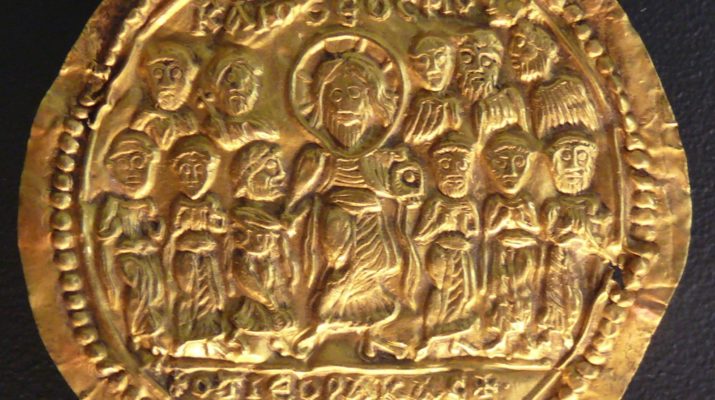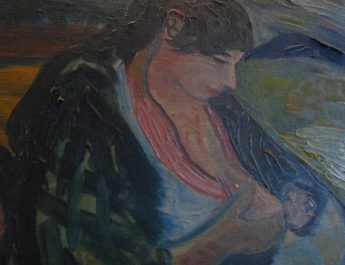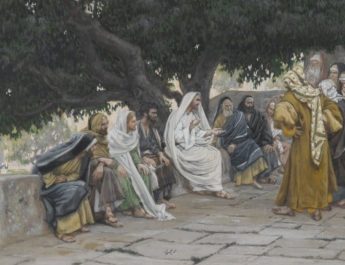John 20:19-31
Pentecost A
19 When it was eveningI on that day,II the firstIII day of the week,IV
I “evening” = opsios. 15x in NT. From opse (after, late, in the end, in the evening); from opiso (back, behind, after); from the same as opisthen (after, back, from the rear); probably from opis (back); optanomai (to appear, be seen by); from horao (become, seem, appear). This is afternoon, evening, nightfall, or late.
II “day” = hemera. Perhaps from hemai (to sit). This is day, time, or daybreak.
III “first” = heis. This is one, a person, only, some.
IV “week” = sabbaton. From Hebrew shabbath (sabbath); from shabath (to rest, stop, repose, cease working; by implication, to celebrate). This is the sabbath. It can also be used as shorthand for a week i.e. the time between two sabbaths.
and the doorsV were lockedVI where the disciplesVII were,
V “doors” = thura. This is opening or closure so it’s a door, gate, or entrance. Figuratively, this can refer to an opportunity.
VI “locked” = kleio. 16x in NT. This is to close, shut, or lock in a literal of figurative sense. Figuratively used for shutting out of the kingdom of heaven or the wedding banquet, the heavens shutting as in there is no rain, and also for heartlessness.
VII “disciples” = mathetes. From matheteuo (to make a disciple of); from manthano (to learn key facts, gain knowledge from experience; generally implies reflection as part of the learning process); from math– (thinking things through). This is a disciple, learner, or student. It is where we get “mathematics” from.
for fearVIII of the Jews,IX JesusX cameXI
VIII “fear” = phobos. From phebomai (to flee, withdraw, be put to flight). This is panic flight, fear, fear being caused, terror, alarm, that which causes fear, reverence, respect.
IX “Jews” = Ioudaios. From Ioudas (Judah, Judas); from Hebrew Yehudah (Judah, son of Jacob, his tribal descendants, a name for the southern kingdom. Literally, it means praised); probably from yadah (to throw one’s hands into the air in a gesture of praise); from yad (hand). This is Jewish, a Jew, or Judea.
X “Jesus” = Iesous. From Hebrew Yehoshua (Joshua, the Lord is salvation); {from YHVH (proper name of the God of Israel; the self-existent and eternal one); {from havah (to become) or from hayah (to come to pass, become, be)} + yasha (to deliver, defend, help, preserve, rescue; properly, to be open, wide or free, which implies being safe. So, in a causative sense, this is to free someone)}. This is Jesus or Joshua in Greek – the Lord saves or the Lord is salvation.
XI “came” = erchomai. This is to come or go.
and stoodXII amongXIII them and said,XIV “PeaceXV be with you.”
XII “stood” = histemi. This is to stand, place, establish, appoint, stand ready, be steadfast.
XIII “among” = mesos. Perhaps from meta (with among, behind, beyond; implies a change following contact or action). This is middle, among, center, midst.
XIV “said” = lego. This is to speak, say, name, call, command. It is generally to convey verbally.
XV “peace” = eirene. Perhaps from eiro (to join, tie together to form a whole). This is one, peace, quietness, rest, peace of mind, harmony. Peace was a common farewell among Jews (i.e. shalom) and this well-wishing included a blessing of health and wholeness for the individual. This word also indicates wholeness and well-being – when everything that is essential is joined together properly. This is peace literally or figuratively. By implication, it is prosperity (but not in the sense of excessive wealth. Prosperity would have meant having enough from day to day.)
20 After he said this, he showedXVI them his handsXVII and his side.XVIII Then the disciples rejoicedXIX when they sawXX the Lord.XXI
XVI “showed” = deiknumi. This is to show in a literal or figurative sense so it can be to teach, bring, or point out.
XVII “hands” = cheir. This is the hand in a literal sense. Figuratively, the hand is the means a person uses to accomplish things so it can also mean power, means, or instrument.
XVIII “side” = pleura. 6x in NT. This is the side or the side of the body. It is where “pleurisy” comes from.
XIX “rejoiced” = chairo. From char– (to extend favor, lean towards, be inclined to be favorable towards). This is to rejoice, be glad or cheerful; a greeting. This is the root verb that the Greek word for “grace” comes from (charis).
XX “saw” = horao. Related to “evening” in v19. See note I above.
XXI “Lord” = Kurios. From kuros (authority, supremacy). This is a respectful address meaning master or sir. It refers to one who has control or power greater than one’s own. So, it was also applied to God and Jesus as Master or Lord.
21 Jesus said to them again, “Peace be with you. As the FatherXXII has sentXXIII me, so I sendXXIV you.”
XXII “Father” = Pater. This is father in a literal or figurative sense. Could be elder, senior, ancestor, originator, or patriarch.
XXIII “sent” = apostello. Related to “stood” in v19. From apo (from, away from) + stello (to send, set, arrange, prepare, gather up); {probably from histemi (see note XII above)}. This is to send forth, send away, dismiss, send as a messenger. It implies one that is sent for a particular mission or purpose rather than a quick errand. This is where “apostle” comes from.
XXIV “send” = pempo. This is to send, put forth, or dispatch. This often refers to a temporary errand. It is sending someone with a focus on the place they departed from. By contrast, another Greek word, hiemi, emphasizes the destination and yet another word, stello, focuses on the motion that goes with the sending.
22 When he had said this, he breathed onXXV them and said to them, “ReceiveXXVI the HolyXXVII Spirit.XXVIII
XXV “breathed on” = emphusao. 1x in NT. From en (in, on, at, by, with) + phusao (to blow). To breathe into or on, to puff.
XXVI “receive” = lambano. It does not refer to passive receiving of something, but active acceptance or taking of something whether it is offered or simply nearby. It focuses on individual decision and action.
XXVII “Holy” = Hagios. From hagnos (holy, sacred, pure ethically, ritually, or ceremonially; prepared for worship, chaste, unadulterated, pure to the core; undefiled by sin; figurative for innocent, modest, perfect). God is totally different from humanity and thus set apart. That which is consecrated to worship God (elements of worship) or to serve God (as the saints) are holy because they are now set apart for God’s purposes. Holy because important to God. This is sacred physically, pure. It can be morally blameless or ceremonially consecrated.
XXVIII “Spirit” = Pneuma. From pneo (to blow, breathe, breathe hard). This is wind, breath, or ghost. A breeze or a blast or air, a breath. Figuratively used for a spirit, the human soul or part of us that is rational. It is also used supernaturally for angels, demons, God, and the Holy Spirit. This is where pneumonia comes from.
23 If you forgiveXXIX the sinsXXX of any, they are forgiven them; if you retainXXXI the sins of any, they are retained.”
XXIX “forgive” = aphiemi. From apo (from, away from) + hiemi (to send). This is send away, release, permit, forgive, allow to depart, discharge, or send forth.
XXX “sins” = hamartia. From hamartano (to miss the mark, do wrong, make a mistake, sin); {from a (not) + meros (a part or share)}. Literally, this means not having one’s share or portion – like not receiving inheritance or what was allotted to you. This word means missing the mark so it is used for guilt, fault, and acts of sin.
XXXI “retain” = krateo. From kratos (strength, power, dominion; vigor in a literal or figurative sense; power that is exercised). This is being strong or mighty so, by extension, to prevail or rule. It can also mean to seize, grasp hold of and thereby control.
Image credit: “Thomas Medallion” – Doubting Thomas from the 7th century, perhaps from Calabria. Photo by Martinus KE, 2023.




